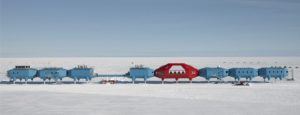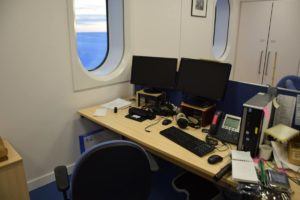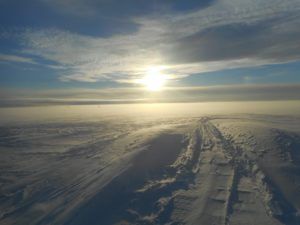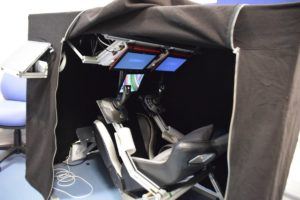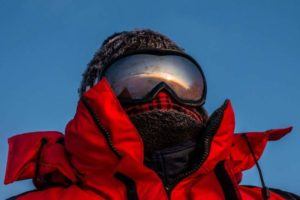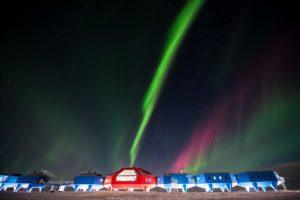Profile
Alexander Finch
Curriculum Vitae
-
Education:
University of Warwick [2003-2007] and Purdue University (in the United States) [2010-2012]
-
Qualifications:
An MEng and an MSc
-
Work History:
I started in banking, but didn’t like what I was doing. I joined a small company in Portsmouth, SSBV, and built components for satellites. Then I worked at the European Space Agency for a while, designing whole satellites. Now I am in Antarctica!
-
Current Job:
Winter Science Engineer at Halley Research Station, Antarctica. I look after physical experiments monitoring the upper atmosphere for climate research, and I’m a test subject for space medicine experiments!
-
Employer:
The British Antarctic Survey
-
My work
I design and build satellites normally, but right now I’m in Antarctica!
-
Read more
Hi! I’m an engineer who has spent time building parts for satellites, and then designed the whole satellites! My last job was with the European Space Agency’s technical facility in the Netherlands, ESTEC. There, I was working to create a satellite to fly in formation with another one and map the surface tomographically ( = in 3D). My role was a systems engineer – a sort of satellite architect who looks at the overall size, shape and capability of the satellite as a whole. I worked as just one part of a team of 40, even though it’s only a design on a computer and nothing has been made yet!!
But right now I am doing something a bit different – I’ve come to Antarctica where I have been living for the past 11 months on a floating ice shelf. Here, I am maintaining and installing experiments to monitor the upper atmosphere and space weather. Since I arrived, I have been through an Antarctic winter – 12 people, cut off from the outside world as no aircraft or ship can get to us for six months, for 105 days of which the sun doesn’t even get above the horizon. The temperature went down to below -50°C and the skies filled with the Aurora! It’s the summer here now, so there are more people (and some fresh food!) but I still have 4 months until a ship takes me home.
Being in Antarctica is mostly for the adventure of it, but this place is also important for astronauts. Because of the isolation, the difficulty of getting things here, the lack of a day-night cycle most of the year and the harsh environment outside, the Antarctic is often seen as a good “testing ground” for the mental and physical health of future long-duration astronauts. Living in a base here is probably as close a simulation as you can get on Earth to a cruise to Mars! As such, our doctor here is doing all kinds of experiments on us – the coolest of which is a Soyuz simulator with which we practice docking the space station! It’s pretty fun but it’s trying to answer an important question: would astronauts going to Mars or an asteroid be able to remember how to do the complex docking after many months of not doing much?
So ask me about satellites, space and Antarctica!
Some websites of interest:
My blog
Bitesized info about Antarctica
The British Antarctic Survey’s website, who I work for now
The European Space Agency, who I worked before before -
My Typical Day
Wake up, drink tea with fake milk, work at a computer, dig some snow to make water, dinner, bed
-
Read more
If I were back in Europe, my day would be:
Wake up, go for a run, have a small breakfast.
Go to work. Read a book on the bus.
Check emails, form day’s to-do list, start doing work
Lunch – very important past of the day for me!
More work stuff after lunch.
Go home.
Eat dinner, preferably with someone!
Play a game, do some household chores, read, whatever I want or need to do!
Sleep.Here in Antarctica, surprisingly, this is mostly exactly the same! There are some small differences though:
My commute is from one side of the station to the other – about 200m – and so no need for a bus to get to and from work!
Occasionally we need to dig snow into a melt-tank to make water to drink and shower with.
If things break outside, I need to dress up warmly, hike out to the experiment in question, and fix it!
There is always company for dinner as we all eat together – no shortage of times to talk here… -
What I'd do with the prize money
Help fund a trip around the UK to explain why we come to Antarctica to study space!
-
Read more
Next summer when I am back home, a friend and I want to travel around the UK explaining why Antarctica is such an important place. We have a load of cool stories we want to tell about your experience here and things we want to show to anyone who is interested. Hardly anyone knows about the Antarctica-space connection so we want to change that… The UK Space Agency is also interested in this and is helping us make it happen!
-
My Interview
-
How would you describe yourself in 3 words?
Rational. Quirky. Adventure-seeking.
What was your favourite subject at school?
Physics. The part with all the experiments more than learning the equations, although that’s kinda important to understand what’s going on!
What did you want to be after you left school?
A spaceship builder – I was lucky that I knew exactly what I wanted to do when I grew up and so could aim for it!
Were you ever in trouble at school?
Only when my homework was late, which was quite often :S
What is the most fun thing you've done?
So many things! A road trip around America, maybe? Getting to the top of Kilimanjaro?
-
-
Work photos:
My home, Halley 6 Research Station:
I work in the second module from the far left, and my room is in the second module from the right. In between is the kitchen, the bar, the lounge, the gym, our food stores and all the generators and equipment needed to keep us alive and well!
My desk:
Pretty messy. I tided it up the other day. It’s messy again now.
The view out of my window:
It’s the same view out of all the other windows here, for that matter.
The Soyuz simulator that we use to test how our skills change over the course of a winter:
Me watching the sun come up for the first time in three months back in August.
It was cold that day…
The Aurora Australis:
During our 3 months of darkness, we got to see several dazzling auroral displays. We’re in pretty much the best imaginable place to see these, and it’s a good year for Aurorae, so I feel very lucky to have seen them.

